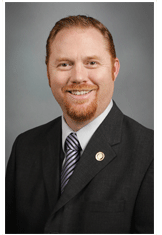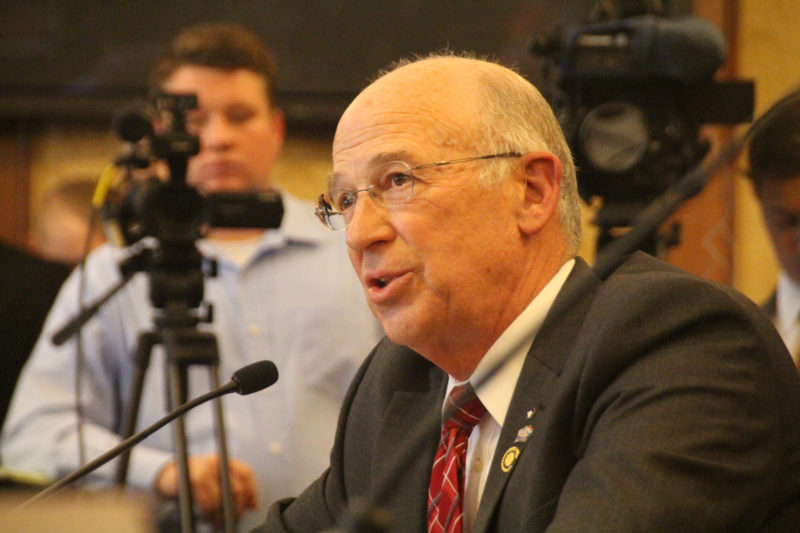Legislation would require transgender students to use restroom of sex on birth certificate
JEFFERSON CITY, Mo. – Last year, a Senate bill purporting to support religious liberty to prevent vendors from providing services for same-sex weddings became arguably the most infamous piece of legislation in the state after a 39-hour filibuster and a contentious House committee hearing drew national attention to the bill. It became a major social issue with several business organizations and human rights groups opposing the law, citing it as a discriminatory measure against the LGBT community.
Sen. Ed Emery’s SB 98 could become the same focus of this year’s LGBT advocacy groups, considering it filled both SCR 1 and 2 to standing room only capacity during a hearing of the Senate Education Committee.
It would require students at the state’s public schools to use the restroom matching the gender on their birth certificate. He says the legislation will deal with what he called recent changes to the traditional binary gender paradigm with more transgender people “coming out” and living more open lives than in the past.
“We now have federal mandates and judicial opinions that have essentially created a new series of gender, genders that don’t align with physiology and biology,” Emery said. “SB 98 says we have the same responsibility to every student to ensure their personal privacy and safety.”
Emery called for the need to maintain the “separation of genders in various states of undress” in locker rooms and bathrooms.
So-called “bathroom bills” have become popular among conservatives, but wildly controversial nationally. North Carolina passed a blanket bathroom bill that applied to people in all public buildings. In response, several state and city governments issued publicly-funded travel bans to North Carolina for non-essential personnel, multiple music performers – notably Bruce Springsteen – cancelled concerts and have pledged to boycott the state until the bill is changed, and the NCAA stripped North Carolina of hosting rights for seven upcoming tournaments, including this year’s NCAA National Championship basketball tournament.
In light of past responses across the country, Sen. Jason Holsman wondered why it was necessary to pass such a bill.

“Do you think this is the direction we want to go to being a welcoming and inviting state?” Holsman said, echoing arguments made last year by businesses opposed to SJR 39.
Alyssa Johnson, a representative for Concerned Women for America, was one of three supporters who showed up to testify on the legislation. She was concerned about her two school-aged children sharing a bathroom with someone of the opposite sex.
“I feel like they would be horrified, I feel like they would be violated,” Johnson said. “It’s a two-way street, we don’t just have to respect everyone that’s different, but they should respect us as well.”
Another Concerned Women for America representative, Bev Ehlen, caused much more of a stir in the room when she said transgender people were suffering from “gender confusion.”
Dozens of people shot their hands up when Sen. Gary Romine, the chair of the committee, asked who was speaking in opposition to the bill. Sara Baker of the ACLU noted the bill would violate the 14th Amendment which provides equal protection under the law, as well as violate some federal statutes and be enacted while a court case about a transgender student was still being heard.
A day before the hearing, Steph Perkins, the executive director of PROMO Missouri, the state’s foremost LGBT rights organization, said it could “other” transgender students – including those who have not publicly announced their transition.
“Forcing a student to use a gender neutral bathroom or that not all students use, isolates and outs them,” he said. “As you can suspect, we’re incredibly disappointed the Senate education committee wants to move forward with this bill.”
Perkins added that he hoped business leaders rallied against the measure as they did against SJR 39, arguing that it still provided a sense of discrimination.
In addition to those advocacy groups, several parents of transgender children, not to mention many transgender children themselves, testified against the bill. One transgender teenager named Samantha cried telling of the bullying she suffered when she starting living as a girl around age 6 after being born as a boy named Samuel.
A St. Louis social worker with her transgender son by her side, told senators about the process her family went through when they came to the realization that one of her twin daughters was a boy after two years of costly tests and therapy.
“My son is not confused, he is not delusional, he is not mentally ill, and he is certainly not a sexual predator,” she said emotionally.








